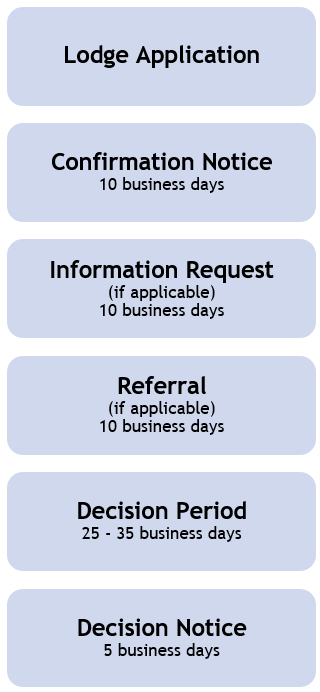Explore information beyond building, plumbing, or drainage work that can impact premises or its usage.
Operational work refers to ‘work, other than building work or plumbing or drainage work, that affects a premises or the use of a premises’.
Operational work may include the following:
To undertake works that align with the above, a development permit may be required from Council. The Table of Assessment in Part 5 of the Townsville City Plan identifies the level of assessment for the proposed Operational Work.
To obtain a development permit, you will be required to lodge a development application with Council for assessment.
When lodging an application, the following materials are required to allow the application to be considered ‘properly made’ and for the assessment process to start:
Depending on the nature of the application, technical reports may also be required for Council’s assessment of the application (traffic, flood, stormwater, noise etc).
Well-prepared applications may proceed through the assessment process faster.
An application can be submitted to Council by one of the following methods:
Fees are applicable to each application lodged with Council. To find the fees associated with an operational work application, please refer to Council’s Fees and Charges schedule.
Fees for assessment and inspection (other than advertising devices) are determined based on the cost of works inclusive of GST.
An RPEQ cost certified work estimate must be submitted at the time of lodgement of the application as required.
The timeframe for an application to be assessed by Council varies depending on the level of assessment. The below illustration demonstrates the legislative timeline for a code assessable application requiring referral. Timeframes can be extended by mutual agreement.

Pre-start Meeting
A pre-start meeting is an onsite meeting before any works are undertaken on the development site. The objective of the pre-start meeting is to ensure that all development work is executed per the conditions of the development approval, while minimising any negative effects on nearby properties and the environment.
Pre-start meetings must be arranged with Council’s Planning Asset team in advance. To book your pre-start meeting, please complete the notice to commence works form.
It is advised that your civil consulting engineer and/or relevant consultant review the pre-start requirements before requesting a pre-start meeting to ensure that all development approval conditions have been met and any essential documentation has been submitted to Council.
The term “on and off maintenance” refers to the completion and compliance with the conditions outlined in the development approval and transferring the responsibility for maintenance of constructed infrastructure assets, such as water, wastewater, and stormwater infrastructure, to Council.
It is important to ensure all required documentation is supplied to Council for review/acceptance prior to requesting an On Maintenance, Off Maintenance or Final inspection. Refer to Section SC.6.4.2 of the development manual for a full list of requirements.
On maintenance
Once all privately constructed assets, such as water supply, wastewater, and stormwater pipes have been completed and are ready to be transferred to Council, a request for an on-maintenance inspection can be made. This involves completing and submitting a maintenance inspection checklist along with the relevant quality assurance documentation and payment of any necessary fees and security bonds.
After the development works have been inspected and approved for maintenance by Council, the ownership of the assets is transferred to Council, marking the beginning of the maintenance period, which typically lasts for at least 12 months. The applicant is responsible and accountable for rectifying any faults or defects with the development works during this period.
Off maintenance
Once all digital and design plans have been finalised and submitted to Council, you can make a request for an off-maintenance inspection at the end of the maintenance period. When the works are approved by Council as completed, the ownership and accountability of the assets are transferred Council.
Works are required to be inspected to ensure compliance with development condition, such as if the works are not required to be placed on maintenance. Once works are complete you are required to book a final inspection with Council to review the works to ensure compliance with the development conditions.